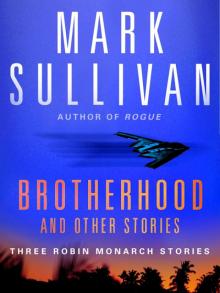- Home
- Mark Sullivan
The Last Green Valley Page 16
The Last Green Valley Read online
Page 16
Gravel scuffed, and pebbles rattled and became slow footfalls coming closer. Emil reset his feet, coiled low, and pressed his left flank into the side of the monument.
Nikolas walked closer, came abreast of the monument, and paused for what felt like an eternity to Emil. Finally, he took a step, and then another, and then he was right there, or at least the tall, dark, sidelong silhouette of Nikolas, towering above and in front of Emil, who exploded from his crouch, driving his legs and propelling his farmer’s shoulders and body low and hard against the side of the bigger man’s right knee.
There was a crunching noise. Nikolas buckled and fell with a howling grunt of pain. Emil dove on top of him and with his powerful left hand pinned the man’s head down, left cheek against the gravel. With his right hand, he held the blade above Nikolas’s throat.
“My knee!” Nikolas cried, and squirmed. “Something’s broken!”
“I don’t care,” Emil said, grinding his face into the gravel. “You don’t care, either.”
“What? I care! My leg’s—”
“I have a slaughtering knife in my hand, Nikolas,” Emil said, and lowered the keen edge of the blade. “Feel it against your throat?”
The man stopped squirming, the fiery pain in his knee forgotten.
“Don’t,” he said. “Please. Have mercy.”
“I’ll give you more than you gave,” Emil said. “You have a choice, Nikolas. Stay away, don’t even look at me, my wife, and sons, and you live. Or I come back, break every bone in your body, and cut your throat ear to ear like a shoat pig.”
Not long after, Emil padded into the courtyard of the mausoleum, his heart still pounding wildly as he passed other refugee families sitting by their small fires on his way to his own family’s fire, which was already down to coals. Adeline and Malia were cooking over it. The rest of his clan looked on hungrily.
He smiled when he stepped up to the circle, noticing the shadows of the angel statue moving in the fire’s glow.
“Where have you been all this time?” Adeline said.
“There was a long line,” he said. “Someone said there’s diarrhea going around.”
Walt thought that was funny. Emil went and sat next to his older son on the marble steps of the colonnade with the statue behind them, put his arm around Walt, and looked at his family, feeling deeply satisfied.
You’re all safe, he thought. You’ll never know what I just had to do for you or what I’ve done for you before. But for now, you’re safe.
Adeline helped Rese scrubbing the pots. “You seem better.”
“I feel better,” Rese said. “Not wanting to throw up. But I have other things to feel bad about. Like Mama says, it’s not hard to find something bad in our lives.”
“What’s bad in yours?”
“Besides Mama?” she said before laughing nervously. “I have no idea if my boyfriend is alive or not.”
“A boyfriend?” Adeline said, smiling. “Since when?”
“Since four months ago,” Rese said. “When I had to go up to Balta for the week.”
Adeline vaguely remembered. “Who is he?”
“A boy from Odessa who got taken off to fight for the Germans,” Rese said. “His name is Stephan. He’s twenty and the handsomest boy I’ve ever seen.”
Adeline could hear the sadness in her voice. “Does he know where you are? Where you’re going?”
Emil’s sister shook her head and wiped at tears that flowed down her cheeks. “I wrote to his mother in Odessa, but I never heard back.”
“Give it time, Rese,” Adeline said. “The war’s not over yet.”
They spent six days camped in the cemetery, and Emil never once saw limping Nikolas look his way. They were nearing the end of their supper on the sixth day when they were notified that a train would take them north to the Warthegau region of Poland, departing Keleti Station at nine thirty the following morning.
Emil did not want to go north to Poland. He wanted to go west, now more than ever. In the short time he’d been in Budapest, he’d talked to enough German soldiers to know that the western Allies were fighting in Sicily and preparing to invade Italy. As far as Emil was concerned, it was only a matter of time before there were other invasions, and soon the western Allies would be sweeping through all of Europe. He wanted to make sure he and his family were in Allied territory when the war ended.
He’d come to realize during the long days in the wagon that much of his life had been subject to a conquering army and a dictator. The Bolsheviks deposed the Czar, and Stalin laid waste to Ukraine. Then Hitler did. And now Stalin had it back. Emil decided he wanted to go where there were no conquering armies, and in his mind that meant west across the ocean, as far from where they started as he could possibly imagine.
“Why are you so cloudy?” Adeline asked as they packed the little wagon.
“I don’t want to go to Poland,” he said. “I want to go west.”
“We’ll go west from Poland,” she said. “The Germans will give us food and a place to live there. I heard many say that.”
“What good are food and a flat if Stalin gets to Poland before the other Allies?”
“I don’t know,” she said, showing rare irritation. “What is your plan, Emil? Are we going to leave the trek? Go off on our own on foot with no protection?”
He thought about that and frowned. “No, I guess not.”
“Then we go north on the train in the morning and go west from the Warthegau as soon as we can.”
It was unseasonably hot in Budapest that May morning, close to unbearable, especially in the heavy clothes they wore. Adeline put the boys in shorts and stripped them to their undershirts before the Martels pushed and pulled the two small wagons through the cemetery and out onto the main road.
They were not far from the rail station, but there was a slight rise to the street, and the sun was blazing hot. No more than a hundred meters from the station, Rese let go the handle of her parents’ cart, put her hand to her forehead, rushed over to one side of the street, and vomited hard and violently enough to take her to her knees. Adeline got to her first.
“I’m all right,” Rese gasped. “It’s the heat. I just couldn’t stop it from coming.”
Adeline helped her up. Karoline gave her a rag to wipe her mouth, and Emil gave her water from the bag, which seemed to perk her up before they reached the crowd of refugees trying to get into the station.
“It’s an hour and fifteen minutes until we leave, and so many are already here,” Karoline said. “Will there be enough room for us all?”
Karoline’s fears were well-founded. By the time they got inside and down the platform, many of the boxcars were already packed with people and their belongings.
“This train looks shorter than the one we came in on,” said Walt, who was riding on top of the little wagon with Will.
“He’s right,” Emil said. “Adella, take my place. I’ll run forward to guard us a spot.”
She came around and took the handle of the wagon while her mother and sister continued to push. Emil disappeared into the crowd and down the platform.
Adeline took glances at the already-full cars as they passed, seeing the faces of people cut loose from everything they’d ever known, some frightened, some resigned, and a few eager with anticipation, which was how she felt. She was wondering what else she might see in the coming days that she’d never seen before, like this train station, the most magnificent building she’d ever been in. She lowered her gaze to see Emil hanging out the side of the boxcar behind the covered coal car and the locomotive.
“I’ve got space for the wagons, but some of us will have to sit up top,” Emil said.
“I’m going up top,” Rese said.
“Sick as you are?” her mother said.
“The wind will do me good, Mama, settle my stomach,” Rese said. “If I go inside, I know I’ll be sick again. Besides, it will be fun to ride on top of a train.”
Karoline looked like she
wanted to argue, but said, “Suit yourself, then.”
With all of them helping, they lifted both wagons into the boxcar and lashed them together and to the wall by the open door. Sweating people were soon jammed behind them, sitting on their own wagons or bags of belongings. Johann, Karoline, and Lydia decided to stay inside with the wagons despite the sweltering heat. After Emil fashioned two ropes with loops that went around the boys’ waists to save them from a fall, Adeline let herself be talked into climbing up with them and Malia onto the roof of the boxcar.
A low railing ran around the perimeter of the roof. Rese was already up there, sitting with her thighs wedged under the rail and dangling her bare feet off the side.
“It’s not as hot up here,” Rese said, excited. “Thank God Mama can’t stand heights. This is going to be fun!”
“This is going to be fun,” Malia said, sitting beside Rese and sliding her legs under the rail. She kicked her feet a few times in the air with a smile. “And your mother means well.”
“Does she?” Rese said. “I get tired of her telling me what to do and how to do it.”
“It’s just the way she was taught,” Adeline said. “You watch, you’ll catch yourself doing the same to your daughter someday.”
Rese looked a little queasy, rubbed her stomach, and belched softly.
“Oh, I hope not.”
The train whistle blew. SS soldiers hurried the last refugees aboard the train. The roofs of their boxcar and the boxcars behind them were now crowded with people trying to get safely seated before the train began to move.
A minute later, it did, belching smoke from its ancient stack, groaning, whining, and then slowly picking up speed. They left the protection of the station’s canopy. The sun beat down mercilessly on them as they rolled past German soldiers and artillery pieces chained to flatbed cars in the rail yard.
Leaving the yard, the train looped southwest through the city and then north, roughly paralleling the Danube River while slowly gathering speed. The wind blew the locomotive smoke away from them, allowing Adeline to catch thrilling glimpses of the bridges that spanned the Danube and, high on a hill, the ancient and grand fortress of the Hungarian kings.
Rese began to sing an old drinking song about a soulful wanderer in search of love, and Adeline and Malia and many other people atop the boxcar joined in with her. For a few moments, Adeline felt her spirits lifted, elated almost and yet easy, and she wondered whether this was what freedom felt like.
By the time they’d cleared the Budapest city limits, Adeline had decided that the locomotive was either very old or very damaged, because it tended to belch thick whips of dark smoke and seemed incapable of traveling very fast. But at top speed and as long as you weren’t straight downwind of the smokestack, the wind made the powerful sun more than bearable. It was . . . well, nice, pleasant. Almost freedom, she decided.
“I like riding up here, Mama,” Will said, grinning.
“I do, too,” Adeline said, smiling and pushing her hair out of her eyes.
Walt leaned his chest against the railing to peer forward up the track. “Here comes a tunnel!”
They swung into the darkness, which made the speed seem faster. Will screamed for joy at the top of his lungs, which made them all laugh. In the next tunnel, Rese joined Will, and soon they were all doing it, screaming for joy every time they hurtled from light to darkness to light once more.
At one point, Rese grinned and laughed as she looked over at Adeline and the boys all anticipating the next tunnel. “This is the best I’ve felt since we left home. I can’t remember being this happy ever, Adeline.”
“We’re on an adventure,” Walt said.
“We are, aren’t we?” Rese said, looking in love with that idea.
“Yes,” Will said, “because you never know how things are going to turn out.”
Five hours into their journey, nearing the Hungarian town of Tata, the train came to another stop above a grassy opening that sloped down to a small lake that was settled at the other end. One of the engineers came out of the locomotive along with Major Haussmann, who walked past them, shouting that there would be a half-hour delay here while military trains passed ahead. While they were all free to get off to relieve themselves or have a cigarette, Haussmann also told them to stay close to the train.
The sun was intense again now that they were no longer moving.
“Pretty lake,” Malia said. “Looks good enough to swim in.”
“I’m game,” Rese said, grinning and putting on her shoes.
“You’re not,” Adeline said.
“Watch me,” Rese said, standing up.
Malia clapped and laughed. “What if Karoline catches you?”
“Oh, what if she does?” Rese said, winking at the boys as she started to climb down the ladder. “I know how to swim, and she doesn’t.”
“I want to go in the water, Mama,” Will said. “It’s hot.”
“Me, too, Papa,” Walt said to Emil, who had climbed up at the last stop.
“None of us knows how to swim,” Emil said. “And I don’t want you to drown.”
Rese, meanwhile, jumped off the bottom rung of the ladder, and with a wave at them all, she started to trot down through the lush spring grass toward the lake a hundred meters off. Other people were exiting their boxcars, some smoking, some going off to piss. But no one headed toward the water except Rese. She reached shore, turned back toward the train, and waved wildly at them, before pivoting and stepping out into the water. She took another awkward step and a third before losing her balance, crashing forward, and submerging.
Rese did not come up.
And she did not come up.
Adeline felt a ball in her throat start to build before Rese’s head suddenly popped out of the lake. She blew out a stream of water, threw back her head, and shrieked with delight before diving under again.
“How did she learn to swim like that?” Malia asked.
“At school in Pervomaisk,” Emil said. “When she was a little girl, she took to it like a fish and—”
The train whistle blew. Major Haussmann came hurrying back up the side of the train, shouting, “Back aboard! The track has cleared ahead. Back aboard or you’ll be left behind!”
Down in the lake, Rese surfaced again. Emil cupped his mouth with both palms and shouted at her, “We’re leaving, Rese!”
She didn’t hear him at first. They all started screaming and waving to her. “Come back to the train! We’re leaving!”
Adeline could tell Rese didn’t believe them at first. They were supposed to be there thirty minutes, after all. But then the train whistle blew a second time and Rese started swimming as fast as she could toward shore. She came up out of the water, held her soaking skirts high, and started running up the hill, following her own path back up through the long grass.
“Come on, Rese!” Malia yelled.
And now they were all hooting at her and calling encouragement. Rese’s grin got bigger and bigger the closer she got to them. She was soaking wet, her clothes had grass all over them, and yet it all made Adeline realize that she’d never known someone quite like her sister-in-law. Rese was pretty and smart and very funny. She did not care what other people thought of her when she did crazy things like this. She was . . . well . . . free in a way that Adeline had never known before. Like Emil said, you know freedom when you see it.
Emil’s mother’s head was sticking out the side of the boxcar, looking at her daughter as Rese reached the bottom of the ladder by the forward left corner of the boxcar.
“What were you thinking?” Karoline yelled at her.
“I wasn’t thinking, Mama,” Rese said as she grabbed the rails of the ladder and stepped onto the first rung with her right foot. “I was swimming, and it felt great!”
She lifted her left foot to make the second rung when the train suddenly jerked and shuddered and jerked again with enough violence to fling Rese sideways and forward off the ladder in a spiraling fall tha
t caused her to crash face-first in the grass and gravel, her chest and belly below the railroad tie and her shins across the rail. The coupler that held the coal car to their car was right behind and above her.
It all happened so fast, Adeline had barely cried out in response to Rese’s fall before the locomotive sighed and the train lurched forward again. The wheels of the boxcar rolled slowly over Rese’s legs, severing both of them at midcalf.
Chapter Fifteen
Emil erupted from his position on the roof of the boxcar, bellowing at the engineers in the locomotive to stop the train. Evidently, Major Haussmann, who was riding in the locomotive, saw the accident and shouted the same thing before the brakes hit, sending shrieks from the wheels and rails that were not loud enough to mask the trumpets of horror blaring from the crowded boxcars as Rese convulsed, squirmed, and rolled down the embankment into weeds at the edge of the clearing.
Scrambling to the ladder, Emil could see blood spurt and mist, spurt and mist from the stumps of what had been her legs. Stop the bleeding, he chanted to himself as he all but slid down the ladder. Stop the bleeding or Rese dies.
He landed hard and spun around to find the SS major almost to his sister. Emil ran to them, stripping his belt as he did.
Haussmann had already removed his own belt and was trying to get into a position to help without being sprayed with blood. Emil did not care; he went straight into the blood and to his knees beside his sister, seeing she was unconscious as he got the belt around her lower left leg, above the stump, and cinched it tight enough to staunch the spurting and the misting. Across from him, the SS major had done the same to her right leg and was now shouting for a medic.
Emil was aware of other people yelling now as he tried to comfort his sister, who was shivering as if it were well below zero while he felt as if he were burning in a hot haze of light.
“Save her!” his mother sobbed. He looked up to see Karoline standing there, her face bleeding from the fall she’d taken from the boxcar after seeing her daughter’s legs severed, and his father behind his mother, struggling to keep her on her feet as she keened, one bony hand covering her mouth and the other outstretched in misery.

 Beneath a Scarlet Sky
Beneath a Scarlet Sky The Last Green Valley
The Last Green Valley Beneath a Scarlet Sky: A Novel
Beneath a Scarlet Sky: A Novel Brotherhood and Others
Brotherhood and Others The Purification Ceremony
The Purification Ceremony